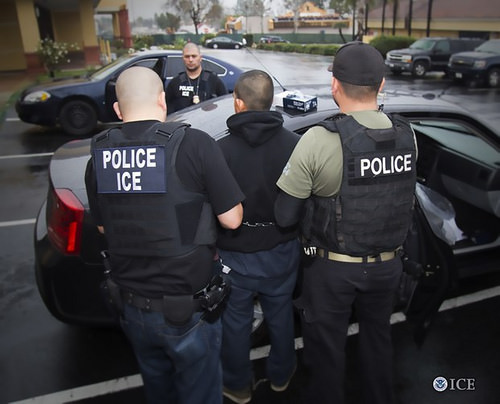Facing an Emboldened ICE – Detentions of Vietnamese Nationals Spike Across Country Under New Administration
Philadelphia, PA – In the past month, the Vietnamese American community has been rocked by a surge of community members apprehended and detained for possible deportation. In the first two weeks of March alone, organizers learned that nearly 100 Vietnamese people were being detained, largely at York County Detention Center in Pennsylvania and Krome Detention Facility in Florida.
Jessica Shullruff Schneider, immigration lawyer and supervisor to the Detention Watch program at Americans for Immigrant Justice in Miami, FL, spoke with a number of the recent detainees at the Krome facility. She commented, “it is abundantly clear that many are people who were raised in the United States, have young families, and are productive members of our communities are being detained because of long-ago mistakes.” Schneider added, “When our harsh immigration laws are enforced blindly like this it often leads to unjust results.”
Southeast Asian refugees from Vietnam, Cambodia, and Laos came to the US en masse in the aftermath of the Vietnam War. Over 1 million people fleeing violence, genocide and starvation were resettled in the US between 1975 and 1995, the largest resettlement of refugees in US history. The following years also saw a rise in Vietnamese immigration, as people reunited with their loved ones through family-based visa petitions.
Similar to other Southeast Asian communities, Vietnamese refugees were primarily resettled in resource-poor areas in the US. As a result, they faced extreme poverty and racism in their adopted communities, leaving many re-traumatized and isolated. The rise of the prison industrial complex in the 1980s and 1990s led to mass incarceration and criminalization, leaving many young Vietnamese refugees and immigrants entrapped in the criminal justice system.
“More Vietnamese came into contact with the criminal justice system than any other Southeast Asian community,” said Tung Nguyen, founder of APIROC (Asian Pacific Island Re-Entry Orange County). Nguyen is himself formerly incarcerated for 18 years. “However, there is still such a stigma in our community that it keeps us silent on these issues.”
Among Southeast Asian refugees, the issue of mandatory detention and deportation has most deeply impacted the Cambodian community. This is largely because both countries have different repatriation agreements with the US. The US-Vietnam repatriation agreement (also known as memorandum of understanding, or MOU) limits the removal of individualswho came to the US priorto 1995. Additionally, the Vietnamese government does not accept those that are unable to prove nationality or prior residence in Vietnam.
“Due to the specific provisions in the Vietnamese agreement, our community thought they would be protected from deportation,” says Nancy Nguyen, the Executive Director of VietLead, a community based organization in Philadelphia. “But the new administration has given ICE new license to detain and surveil our communities – and the result has been a serious upsurge of new detentions, even for individuals who cannot be deported under the MOU.”
Vinh Ly was one of these individuals. Born in a refugee camp in 1982, he came to the US in 1989 with his family from Vietnam. He got caught up in a drug case in 2002 when he was 20. Ly, who was incarcerated in 2002, had been checking in with ICE under supervision ever since. He became suspicious when his ICE officer asked him to check-in earlier than usual and contacted local advocates from 1Love Movement and VietLead. According to Ly, “I felt lost and scared and didn’t know [I would be detained again] because I didn’t fit under the MOU. Once I got to York, PA I met another guy in the same situation I was in. We both didn’t know why we were being detained.” Ly was in fact detained by ICE.
With quick action from advocates, organizers and supporters, Mr. Ly was released from ICE detention within 24 hours, but only after after he was shackled and put on a bus from Philadelphia to York County Detention Center. “When I got out, the first thing I wanted to just to get home to my family,” said Ly.
As community organizations across the country have started to field calls from impacted Vietnamese individuals and their families, Vietnamese organizers and advocates have responded to the crisis by forming a national support network. “Vietnamese American families facing the threat of deportation need to know they are not alone,” said Quyen Dinh, executive director of the Southeast Asia Resource Action Center (SEARAC). “They have a whole community fighting for them.”
“We are organizing in our communities and encouraging them to seek help rather than staying quiet,” added Tung Nguyen from APIROC. “Our immigrant and criminalization laws are unjust and we need to mobilize to end this in our communities.”
If you or a loved one are being impacted by this situation, please call 856-320-6668 for support with VietLead in Philadelphia, PA.
Photo left: At bus station California Bell-Gardens 4/4/2017 (AFP)
Here are some resources for those under the threat of deportation:
Getting Pro-Bono Legal Help – SEARAC directory of individuals and organizations with expertise in criminal deportation and Southeast Asian Americans
Know Your Rights: Everyone has certain basic rights, no matter who is president (National Immigration Law Center)
President Trump’s Raids on Immigrant Communities: What do we know? What can you do? (National Immigration Law Center)
Resource Guide for Southeast Asian Americans Facing Criminal Deportation (SEARAC)





